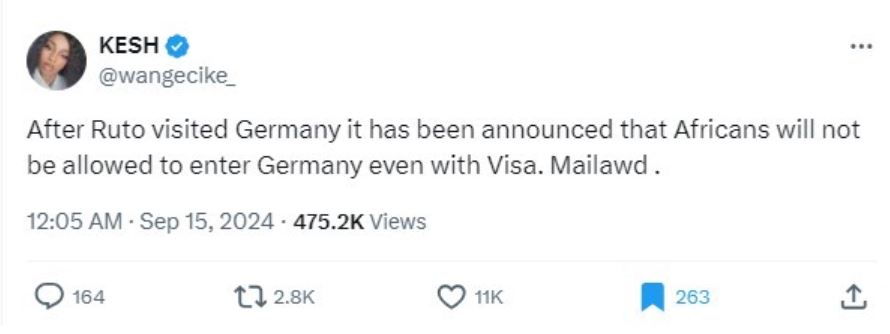Germany’s latest border control measures have sparked a wave of misinformation in Kenya, just days after President William Ruto signed a labour and migration agreement with German Chancellor Olaf Scholz. Reports circulating online claim that all Africans – even those with valid visas – are now being banned from entering Germany following Ruto’s visit. However, these claims are false. Official documents released by Germany show that restrictions only apply to people who attempt to enter the country without the correct papers.
On September 15, 2024, a after X claimed: “After Ruto visited Germany, it was announced that Africans would not be allowed to enter Germany even with a visa.”
The post was shared more than 2,800 times and came from a Kenyan account called “KESH” with more than 130,000 followers.
The same claim was echoed by other Kenyan social media users on X (here And here) and further Facebook.
Kenya-German deal
Ruto attended the annual Citizens’ Festival in Germany from September 13 to 14.
While there, the country’s two leaders spoke signed an agreement that allows skilled workers from Kenya to live and work in the EU’s largest economy (archived here).
Misleading claims about the deal spread online, further fueled by Ruto’s comments during a interview with a German broadcaster, where he said the deal will “create 250,000 jobs for young Kenyans” (archived here).
However, the German Ministry of the Interior later refuted this claim, which states that “the agreement does not contain any numbers or quotas for skilled workers who will be given the opportunity to work in Germany” (archived here).
Ruto’s comments were highlighted by mainstream media outlets such as the BBC report the figure before they corrected their reports (archived here).
According to Chancellor Scholz, the aim of the agreement is to tackle the ageing and shrinking German workforce while streamlining the repatriation of migrants who have been denied entry.
Illegal immigration is a flashpoint in Germany, where populist fears are surfacing. heated up A recent series of extremist attacks have helped the far-right anti-immigration AfD party gain significant ground (archived here).
Shortly after the agreement was signed on September 13, 2024, social media posts in Kenya gave the false impression that Germany had imposed a blanket entry ban on Africans, including visitors from the continent with valid entry documents.
Border control
Along with Ruto’s misleading comments about the terms of the bilateral deal, the claims began to spread when Germany was set to introduce stricter border control guidelines on September 16, 2024 (archived here).
Germany has expanded border controls with all nine neighbouring countries to prevent the arrival of illegal migrants, a move that has sparked protests from other EU member states.
Germany is located in the heart of Europe and borders nine countries that are part of the visa-free Schengen area, which allows the free movement of people and goods.
But the new measures mean that checks at all border posts have been tightened.
However, Cornelius Funke, spokesman for the German Interior Ministry, denied claims that all Africans are now banned from entering the country.
“This claim is false and has no basis whatsoever,” Funke told AFP Fact Check.
In a press releaseThe Ministry of the Interior has urged travelers and commuters to carry identity documents (archived here).
The press release said that since checks were introduced along large parts of Germany’s eastern border in October last year, around 30,000 people have been denied entry.
“Entry is currently being denied to people who do not have valid entry documents, who present forged or falsified documents, or who attempt to enter without a visa or valid residence permit,” the German government statement said.







